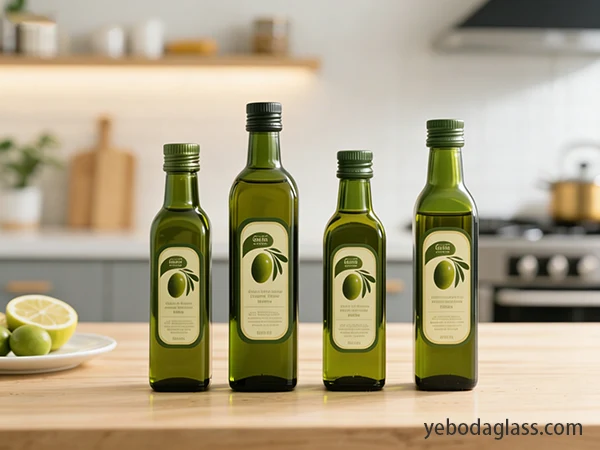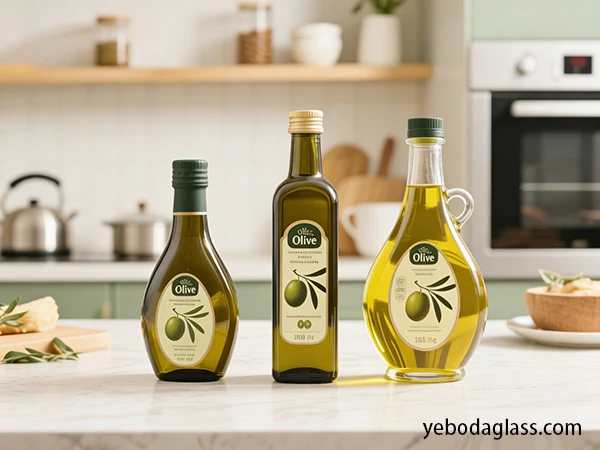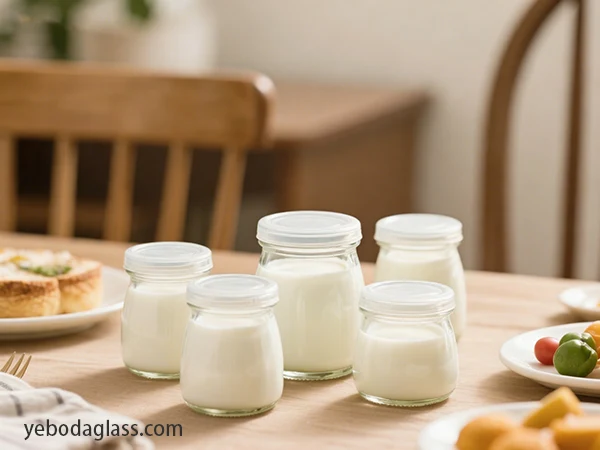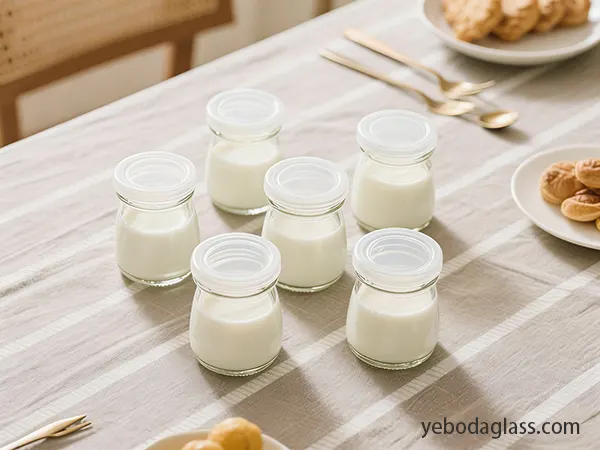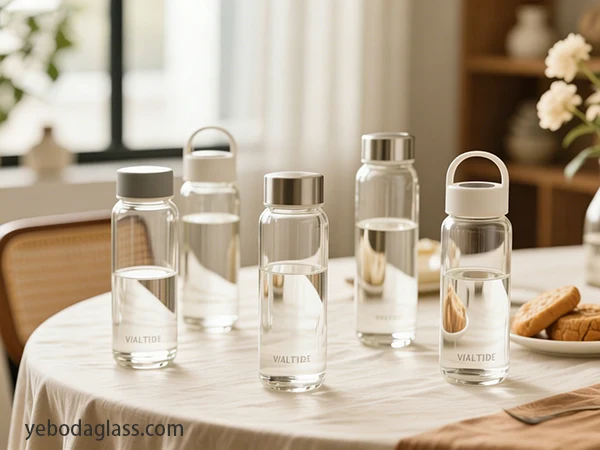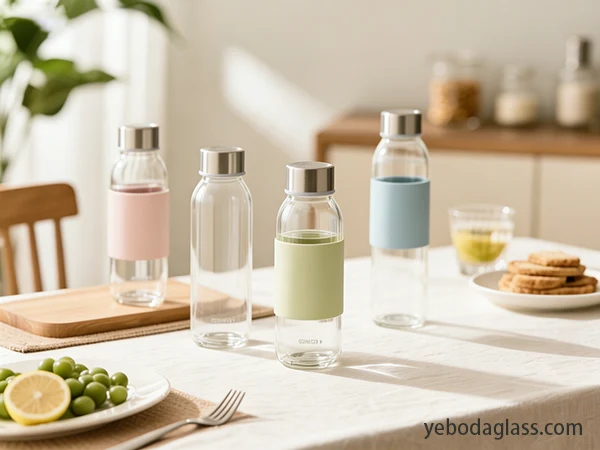Einleitung
Die Umwandlung gewöhnlicher Einmachgläser in individuell gestaltete, marktreife Produkte basiert auf einem detaillierten strategischen Rahmen. Dieser Rahmen dient nicht nur als Leitfaden für die zu treffenden Entscheidungen, sondern auch als Instrument zur Antizipation der wichtigsten Kostenfaktoren, Risiken und der Machbarkeit des Produktionsprozesses. Im Falle von Einmachgläser individuell gestalten
Die anfänglichen strategischen Entscheidungen haben entscheidenden Einfluss auf die späteren Phasen des Prozesses – die Entwicklungs- und Konstruktionsphasen sowie die Ausrichtung der Lieferkette. Ein klar definierter Weg verringert das Fehlerrisiko und ermöglicht die Erfüllung der festgelegten funktionalen und ästhetischen Ziele.
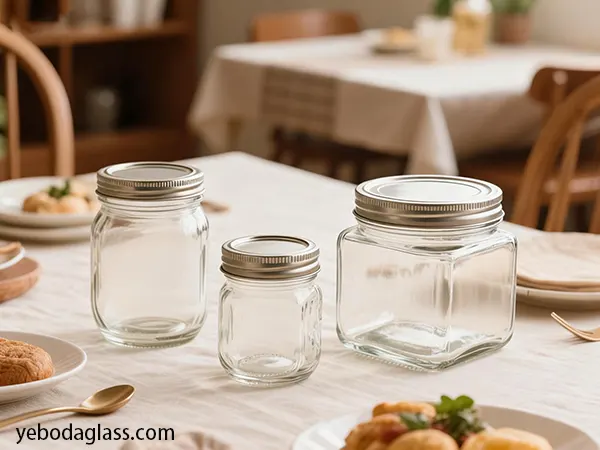
Production Scale (Volume)
Die Art der Personalisierung hängt hauptsächlich vom Produktionsvolumen ab, welches sich bei der individuellen Gestaltung von Einmachgläsern direkt auf die Werkzeuge, Maschinen und Dekorationstechnologien des Projekts auswirkt.
Geringes Volumen: <5.000 Einheiten (Boutique oder Testläufe)
- Technologien: Digitaldruck, Lasergravur, Aufkleberapplikation
- Vorteile: Infinite flexibility, no mold investment, fast iteration
- Anwendungsbereiche: Hochzeitsgeschenke, saisonale Neuheiten, handwerkliche Marken
Dieser Maßstab eignet sich perfekt für das Projekt „Mason Jars Individualisierung“ mit kleinem Volumen, das eine hohe gestalterische Flexibilität erfordert.
Mittleres Volumen: 5.000–50.000 Einheiten (Regionale Marken)
- Technologien: Siebdruck, Sprühbeschichtung, halbautomatische Produktion
- Lieferkette: Die Vorratsgläser werden üblicherweise auf dem freien Markt beschafft, während die Dekoration von externen Dienstleistern übernommen wird.
Der in diesem Beispiel behandelte Bereich stellt den größten Teil der kommerziellen Mason-Jars-Projekte dar, bei denen ein ausgewogenes Verhältnis zwischen Kosteneffizienz und Individualisierungstiefe erreicht wird.
Hohes Volumen: >50.000 Einheiten (Nationaler/Globaler Vertrieb)
- Technologien: IS machine manufacturing, ceramic printing, automated coating lines
- Lieferkette: Fully-vendor partnerships, long-term forecasting
In dieser Phase gewinnt die Kostenoptimierung pro Einheit an Bedeutung. Projekte zur Herstellung von Einmachgläsern in großen Mengen können die Entwicklung eigener Formen erheblich nutzen, um langfristig Qualität zu sichern und Kosten zu senken.
Mason Jars – Komplexität anpassen
Oberflächengestaltung
Die Oberflächengestaltung verändert lediglich die Außenseite von Einmachgläsern, während die strukturelle Geometrie erhalten bleibt. Die meisten der verwendeten Techniken sind:
- Werbung durch Bedrucken von Glas
- Digitaldruck
- Schrumpfschläuche
- Lasergravur
- Beschichtungen (matt, matt, Farbverläufe)
Durch Oberflächengestaltung ist praktisch jedes Design möglich, und das alles mit Standard-Formgefäßen.
Strukturelle Modifikation
Strukturelle Modifikation bedeutet, dass man eigene Formen herstellen muss; die Möglichkeiten sind:
- Geprägte oder vertiefte Logos
- Neue Formen und Konturen
- Nicht standardmäßige Kapazitäten
- Individuelle Halslackierungen
Dieser Vertriebskanal investiert am meisten in die individuelle Gestaltung von Einmachgläsern und verleiht der Marke dadurch eine starke, unverwechselbare Präsenz.
Endanwendung
Speisen und Getränke
Höchste regulatorische Anforderungen: Temperaturwechselbeständigkeit, FDA/EG-konform mit Lebensmittelkontakt. Die hermetische Deckelkompatibilität gewährleistet Produktsicherheit bei Heißabfüllung und Pasteurisierung.
Kosmetik & Körperpflege
Schwerpunkt auf chemischer Verträglichkeit, ästhetischer Qualität und Markendifferenzierung.
Dekorative und allgemeine Aufbewahrung
Die vielseitigste der drei Varianten: Sie ermöglicht auch Beschichtungen, die nicht für Lebensmittel geeignet sind, unkonventionelle Oberflächenbehandlungen und kreative Designs.
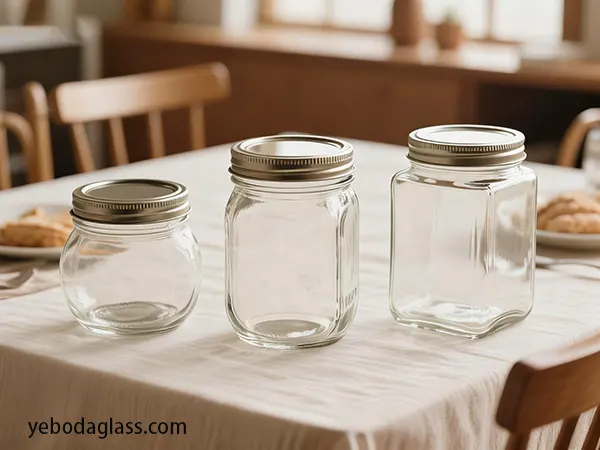
Yeboda Advantage in Mason Jars – individuell anpassbar
Mit einem Komplettpaket zur individuellen Gestaltung von Einmachgläsern, Yeboda ist ein integrierter Anbieter für Formenbau, Glasformung und hauseigene Dekoration. Diese Struktur reduziert die Komplexität durch die Zusammenarbeit mit zahlreichen Lieferanten und gewährleistet eine gleichbleibende Qualität in allen Produktionsphasen – von der Herstellung der Einmachgläser bis zum marktreifen Endprodukt.
Materialwissenschaft und Komponentenspezifikation
Die sorgfältige Materialauswahl und die präzise Detaillierung der Komponenten sind entscheidend für die Leistungsfähigkeit, Sicherheit und Marktakzeptanz von Einmachgläsern. Eine gründliche Prüfung an dieser Stelle garantiert, dass Ihre Gläser nicht nur den gesetzlichen Bestimmungen entsprechen, sondern auch ein luxuriöses Erscheinungsbild vermitteln und somit Ihre Markenbekanntheit steigern.
Glaszusammensetzung und -qualität
Die Wahl des richtigen Glases ist entscheidend. Kalk-Natron-Glas eignet sich hervorragend für Einmachgläser, da es robust, klar und leicht zu recyceln ist. Borosilikatglas hingegen ist extrem hitzebeständig und daher die beste Wahl für Gläser, die erhitzt werden oder über einen längeren Zeitraum aufbewahrt werden sollen. Durch die Standardisierung der Glasstärke können Großbestellungen nicht nur hinsichtlich des Aussehens, sondern auch der Glasfestigkeit geprüft werden.
Verschlusssysteme und Dichtungsintegrität
Der Verschluss spielt eine entscheidende Rolle für das Gesamtkonzept des Glases. Schraubdeckel, Klappdeckel und luftdichte Verschlüsse sollten mit der gewählten Glasart kompatibel sein. Hochwertige Dichtungsringe verhindern Auslaufen, halten das Produkt frisch und schützen seine Qualität, wodurch die Wahrscheinlichkeit von Retouren sinkt. Standardisierte Halsgrößen erleichtern den Deckelwechsel, da verschiedene Deckeltypen ohne Größenbedenken verwendet werden können. Auch die Beschaffung größerer Mengen wird dadurch vereinfacht.
Bauteilhaltbarkeit und Anpassungsmöglichkeiten
Langlebigkeit und Haltbarkeit sollten nicht nur für das Glas selbst gelten, sondern auch für Deckel, Dichtungen und andere Teile. Sie müssen Handhabung, Transport und wiederholtes Öffnen der Gläser unbeschadet überstehen. Unternehmen und Marken können diese Phase zur Personalisierung nutzen, beispielsweise durch das Aufbringen von Logos, mattiertes oder getöntes Glas und spezielle Oberflächenveredelungen. Diese Material- und Komponentenänderungen beeinflussen die Qualitätswahrnehmung der Verbraucher direkt und sind daher entscheidend für die Differenzierung eines Unternehmens im Markt.
Einhaltung gesetzlicher Vorschriften und Sicherheitsstandards
Alle Materialien, die mit Lebensmitteln in direkten Kontakt kommen, müssen den Vorschriften verschiedener Aufsichtsbehörden weltweit, wie beispielsweise der FDA und den EU-Standards, entsprechen. Glasgefäße Ihre Bestandteile sollten keine Schadstoffe enthalten und die Produktqualität auch nach langer Lagerung gewährleisten. Die dokumentierten Qualitätskontrollen und Zertifizierungen können für B2B-Käufer, die Lieferanten für Großbestellungen von Einmachgläsern auswählen, ausschlaggebend sein.
Design für die Fertigung (DFM) bei Einmachgläsern – Anpassungsmöglichkeiten
DFM ist der Prozess, der den Kern von Kreativität und Ingenieurskunst bildet. Er entscheidet darüber, ob die Konzepte in eine wiederholbare, fehlerfreie Produktion bei Projekten mit individuell gestalteten Einmachgläsern umgesetzt werden können.
DFM für Oberflächendekoration (Anpassung von Standardbehältern)
Anforderungen an die Grafikbearbeitung
- Vektorformate (AI, EPS, SVG): Unverzichtbar für Siebdruck und Gravur
- Rasterformate (TIFF, PNG, PSD): Ein Muss für den Digitaldruck
- Auflösung: Mindestens 300 DPI
Farbmanagement
- Pantone PMS-Farbanpassung
- Schichttrennung für den Mehrfarbendruck
- Stabilitätsprüfung der Produktionsfarbe
Druckverzerrungsanalyse
- Anpassung bei Verjüngungen oder Doppelkurven durch anamorphotische Skalierung
- Verwenden Sie Vorlagen für Einmachgläser und prüfen Sie die Druckgrenzen, um Projekte individuell anzupassen.
DFM für die Herstellung proprietärer Formen
CAD-Modellierung
- Tiefgangwinkel: 1–3 Grad
- Gleiche Wandstärke
- Strukturelle Radien zur Spannungsreduzierung
- Anti-Stress-Konturmuster
Halsfinish-Spezifikation
- Standardausführungen: 70-450, 86-400, 63-203
- Gewährleistet Kompatibilität mit Verschlüssen für Einmachgläser
Prägetechnik
- Halten Sie das minimale Verhältnis von Tiefe zu Wandstärke ein.
- Kanten abrunden, um Schwachstellen zu vermeiden
- Ausgewogene Konstruktionsplatzierung für Formgleichmäßigkeit
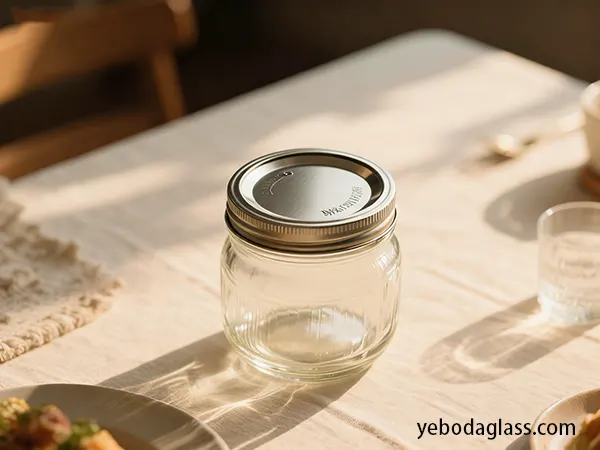
Fertigungs- und Anpassungsmethoden
Kundenspezifische Formenherstellung & Glasformung
Formenbau
- CNC-gefräst aus Gusseisen oder Bronze
- Besteht aus Rohling, Blasform und Halsring
Glasschmelzen & Zuführung von Glasklumpen
- Schmelztemperatur: 1500°C+
- Toleranz des Kuppelgewichts: ±1%
Formgebungsprozesse
- Drücken und blasen: Weithals-Einmachgläser
- Schlag auf Schlag: Einmachgläser mit schmalem Hals
Glühen
Die inneren Spannungen im Glas werden durch den Einsatz von Kühlrohröfen mit kontrollierten Abkühlkurven beseitigt.
Techniken zur Oberflächengestaltung
- Siebdruck (ACL): Langlebige Keramiktinte, ideal für mittleres bis hohes Druckvolumen
- Digitaler Direktdruck: Vollfarbig, kleine bis mittlere Auflagen
- Aufkleber: Hochdetaillierte, manuelle Anwendung
- Lasergravur: Permanente, haptische Premium-Markenbildung
- Beschichtungen: Matte, frostige, metallische, Farbverlaufs-Oberflächen
Durch die Anwendung dieser Techniken können die Einmachgläser individuell gestaltet werden, wodurch die Ergebnisse so vielfältig wie die Techniken selbst sind und eine effiziente Produktion gewährleisten.
Architektur der Lieferkette & Partnerqualifizierung
Multi-Vendor-Modell
- Vorteile: Cost competition, flexibility
- Nachteile: Alignment challenges, complex logistics
Integriertes Partnermodell
- Ein einziger Lieferant übernimmt die Formenherstellung, die Glasformung, die Dekoration und die Verpackung.
- Vorteile: Gleichbleibende Qualität, kürzere Lieferzeiten, geringeres Risiko
Checkliste zur Partnerqualifizierung
- Zertifizierungen: ISO, FSSC
- Maschinenkapazität und Dekorationskapazität
- Fachkompetenz im Bereich Lebensmittelkontakt
Wirtschaftlichkeitsanalyse: Kostenmodellierung und Machbarkeit
Eine umfassende Wirtschaftlichkeitsanalyse ist notwendig, um festzustellen, ob sich die Umsetzung eines Projekts zur individuellen Gestaltung von Einmachgläsern lohnt. Die Kosten lassen sich in zwei Hauptgruppen unterteilen: einmalige Entwicklungskosten (NRE) bzw. Einrichtungskosten und Stückkosten. Die optimale Vorgehensweise zur individuellen Gestaltung hängt maßgeblich von der Bestellmenge ab.
Vergleich der Kostenstruktur von Mason Jar-Anpassungsmethoden
Die folgende Tabelle bietet einen Vergleich der wichtigsten Anpassungsmöglichkeiten. Die Kostenangaben dienen lediglich der Veranschaulichung und können je nach Projektkomplexität, Region und Lieferant variieren.
| Anpassungsmethode | Werkzeug-/Einrichtungskosten (NRE) | Stückkosten (bei 10.000 Einheiten) | Stückkosten (bei 100.000 Einheiten) | Übliche Lieferzeit | Ideale Chargengröße |
| Spezialform | 15.000−15.000−50.000+ | Hoch (amortisierte NRE) | Niedrig | 12-20 Wochen | 100,000+ |
| Siebdruck | 200–200–800 pro Farbe | Mäßig | Niedrig | 4-8 Wochen | 5,000 – 500,000 |
| Digitaldruck | 50−50−200 (Dateivorbereitung) | Mittel bis hoch | Mäßig | 2-5 Wochen | 100 – 20,000 |
| Lasergravur | 50−50−200 (Dateivorbereitung) | Hoch | Hoch | 3-6 Wochen | 50 – 5,000 |
| Aufkleberapplikation | 100−100−500 (Druckeinstellungen) | Hoch | Mittel bis hoch | 5-9 Wochen | 500 – 15,000 |
Wichtige finanzielle Überlegungen:
- Amortization: Um die tatsächlichen Kosten pro Einheit zu ermitteln, müssen die hohen einmaligen Entwicklungskosten (NRE) einer kundenspezifischen Form auf das gesamte erwartete Produktionsvolumen verteilt werden.
- Gesamtbetriebskosten (TCO): Beim Vergleich eines Multi-Vendor-Ansatzes mit einem integrierten Partneransatz ist es ratsam, neben den Herstellungskosten auch die Kosten für Versand, Lagerung und die Kosten, die durch Qualitätsmängel entstehen, zu berücksichtigen.
Strategische Zusammenarbeit und Innovation bei Mason Jars – Individuelle Anpassung
Lieferanten-Partner-Ansatz
Die Umwandlung eines Lieferanten in einen Partner ist eine Möglichkeit, ein Projekt zur Individualisierung von Einmachgläsern zu optimieren. Eine frühzeitige Zusammenarbeit kann zur gemeinsamen Entwicklung neuer Glasformen, individueller Prägungen und maßgeschneiderter Beschichtungen führen und somit Machbarkeit und Innovation gewährleisten.
Gemeinsame Forschung und Entwicklung zur Differenzierung
Die gemeinsame Produktentwicklung ermöglicht es Mason Jars, Projekte mit leichten Glasdesigns, mehrfarbigem Digitaldruck und haptisch ansprechenden Oberflächen individuell zu gestalten. Innovationen, die aus strategischen Partnerschaften resultieren, sind stets produktionsfreundlich, sodass Funktionalität und Ästhetik gleichermaßen optimiert werden.
Digitale Integration
Gängige ERP-Systeme und Echtzeit-Tracking dienen sowohl der Produktions- als auch der Bestandsoptimierung. Ein digital integriertes Projekt zur individuellen Gestaltung von Einmachgläsern ermöglicht eine schnelle Reaktion auf die Marktnachfrage und gewährleistet eine gleichbleibende Chargenqualität.
Qualitätssicherung und Einhaltung gesetzlicher Vorschriften
Umfassende QA-Protokolle
Qualität steht bei allen Projekten zur Personalisierung von Einmachgläsern an erster Stelle. Zu den Prüfverfahren gehören die Maße, die Gleichmäßigkeit der Wandstärke und die Genauigkeit des geprägten Logos. Sowohl automatisierte Sichtprüfungen als auch manuelle Kontrollen gewährleisten die hohe Qualität aller Chargen personalisierter Einmachgläser.
Lebensmittelsicherheit und Materialkonformität
Bei lebensmittelechten Einmachgläsern muss die individuelle Gestaltung strikt den FDA- und EU-Vorschriften entsprechen. Die verwendeten Tinten, Beschichtungen und Verschlüsse müssen lebensmittelecht zertifiziert sein, und die hermetische Versiegelung gewährleistet die Unversehrtheit des Produkts.
Dauerhaftigkeits- und Haftungsprüfung
Bei bedruckten und beschichteten Einmachgläsern umfassen die Tests die Beständigkeit gegen Abrieb, Spülmaschinenzyklen und UV-Strahlung. So wird sichergestellt, dass die Kundenerwartungen erfüllt und die gesetzlichen Bestimmungen für das individualisierte Produkt eingehalten werden.
Wirtschaftliche Machbarkeit und Zukunftstrends
Kostenanalyse und ROI
Die wirtschaftliche Planung von Projekten zur Personalisierung von Einmachgläsern sollte die Entwicklungskosten, die Stückkosten und die Logistik berücksichtigen. Eine detaillierte ROI-Analyse ist das Instrument, um die richtige Entscheidung hinsichtlich der Personalisierungsmethode zu treffen und das Volumen an die Budgetvorgaben anzupassen.
Neue Materialien
Umweltfreundliche Lösungen wie leichteres Glas, Glas aus Recyclingmaterialien und biologisch abbaubare Beschichtungen werden bei der Individualisierung von Einmachgläsern immer mehr zum Standard. Diese Verbesserungen steigern nicht nur den Markenwert, sondern schonen auch die Umwelt.
Technologische Fortschritte
Technologien wie KI-gestützte Qualitätskontrolle, Direktdruck und intelligente Verpackungsmethoden ermöglichen skalierbare Projekte zur individuellen Gestaltung von Einmachgläsern in hoher Qualität. Der Einsatz dieser Technologien ebnet den Weg für die Massenproduktion individualisierter Produkte mit gleichbleibender Leistung und hoher Kundenzufriedenheit.
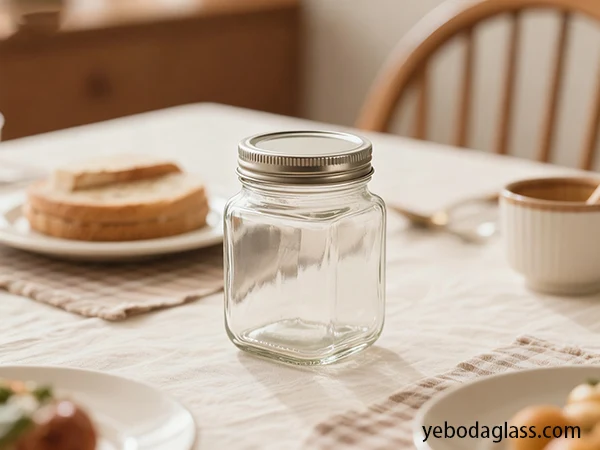
Abschluss
Die Personalisierung von Einmachgläsern hat sich von einer reinen Verschönerung zu einem komplexen Feld mit anspruchsvoller Technik und Lieferkettensteuerung entwickelt. Der strategische Rahmen – der neben Design for Manufacturing (DFM) auch Fertigung, Qualitätskontrolle, Einhaltung gesetzlicher Bestimmungen und die Integration der Lieferkette umfasst – ist der entscheidende Faktor für das Projekt, unabhängig davon, ob das Ziel eine exklusive Markenentwicklung oder der globale Vertrieb ist. Die nächste Ära der Personalisierung von Glas-Einmachgläsern ist geprägt vom Streben nach mehr Nachhaltigkeit, intelligenteren Lösungen und größerer Designfreiheit. Die Gewinner der nächsten zehn Jahre Innovation im Bereich Glasverpackungen werden die Marken sein, die technisches Know-how, langfristige Planung und die sorgfältige Auswahl von Partnern in ihrem Ansatz zur Personalisierung vereinen.

